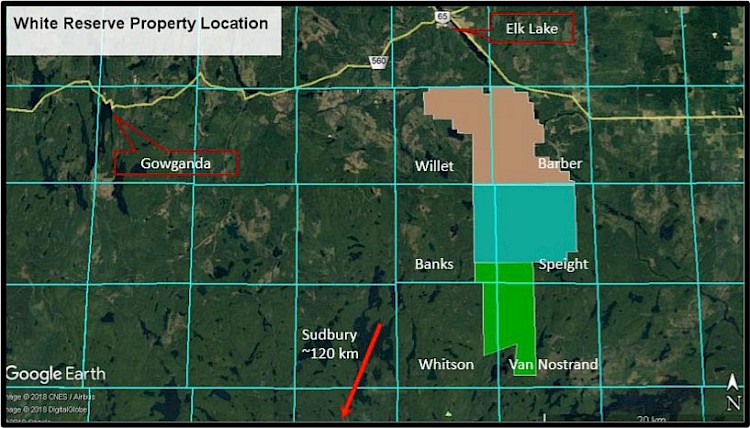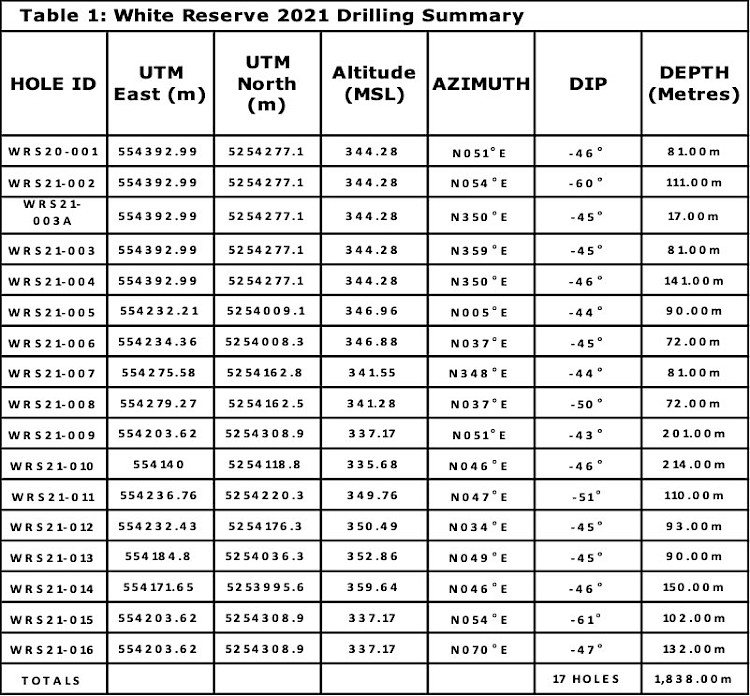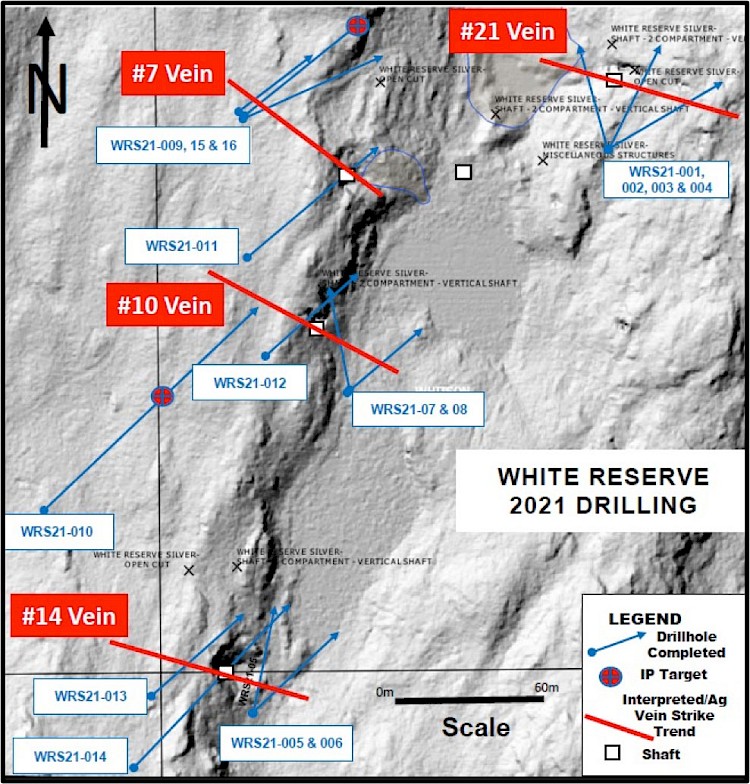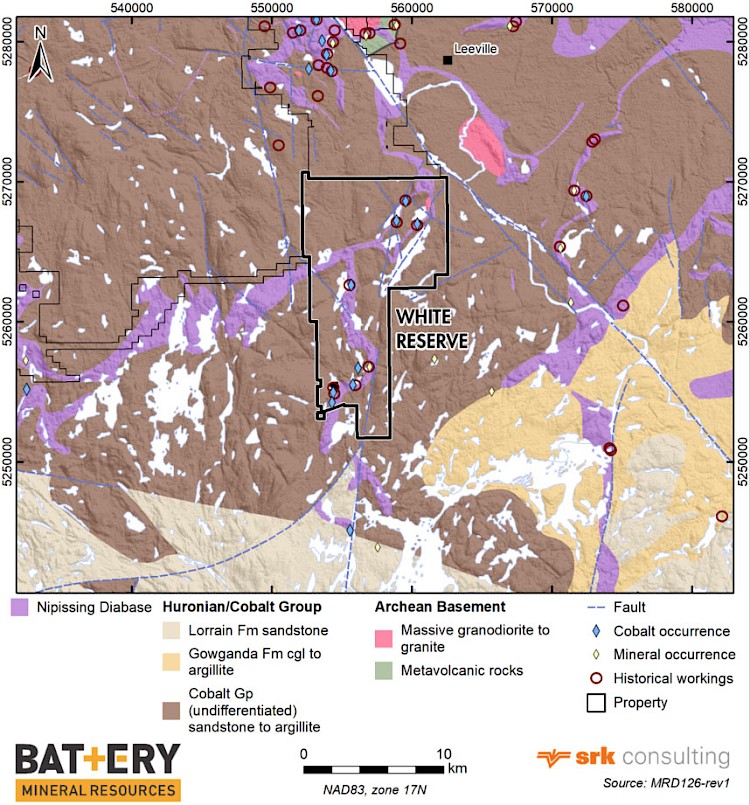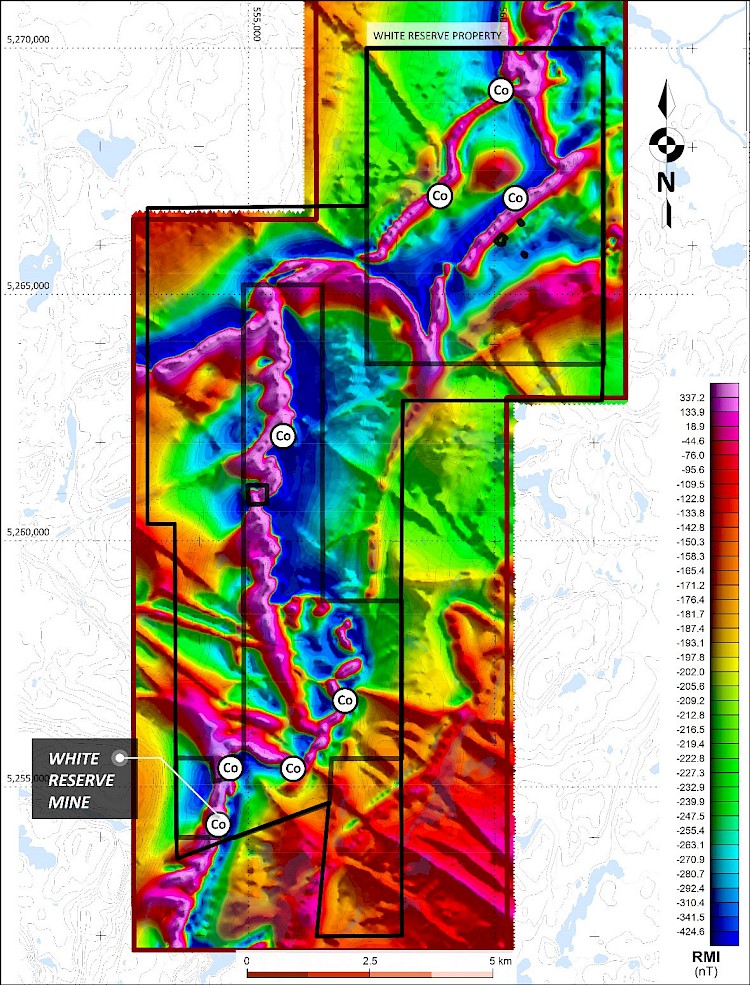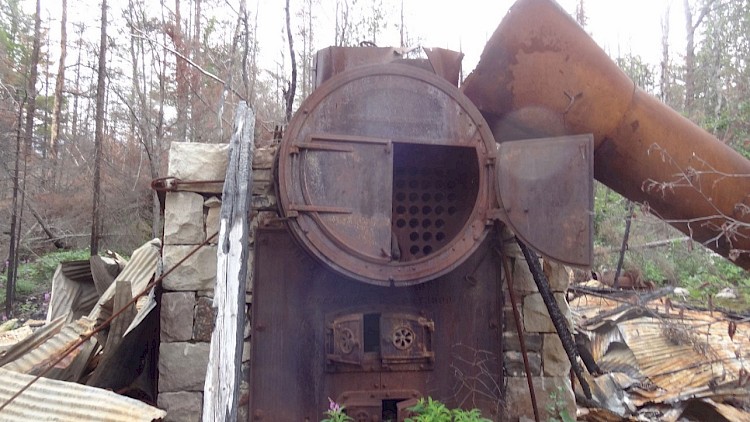Vancouver, British Columbia – (May 5, 2021) – Battery Mineral Resources Corp. (TSXV: BMR) ("Battery" or "BMR" or the "Company") is pleased to announce that drilling intercepted 4 main cobalt mineralized structures on the recently completed and initial diamond drill program at the White Reserve Project located about 120 kilometres northeast of Sudbury and 30 kilometers southwest of town of Elk Lake.
Highlights:
- 17 drillholes completed for 1,838 meters ("m");
- Targets identified from recent three-dimensional model of historic underground mine workings and results of a recent geophysical model;
- Samples have been dispatched for assay and results are pending.
About the White Reserve program
The White Reserve property comprises 616 mining claims totaling 12,984 hectares of contiguous mining claims located in Banks, Barber, Speight, Van Nostrand and Whitson townships (Figure 1). Much of the White Reserve property was burnt by a devasting forest fire during the summer of 2018 (Photo 1). The 2018 fires severely limited access to the property with only a limited number of reconnaissance prospecting, geological mapping and rock sampling traverses completed.
In 2019 a grid-based geophysical three-dimensional distributed induced polarization ("3D IP") survey was conducted by Canadian Exploration Services. Limited rock grab sampling of rock dumps and surface outcrops yielded anomalous cobalt values ranging from 0.02% to 3.90% cobalt and 0.26g/t to 5.90g/t silver.
BMR compiled a 3D geological model of the historic workings and main vein structures to identify targets and design the drill program (17 drillholes / 1,838m). The drilling targeted both strike and vertical extensions of the main veins and two high chargeability induced polarization geophysical targets.
The four main east-west striking quartz-carbonate-silver-cobalt vein structures were drill tested. Several of the holes were also planned to test a north-south high chargeability 3D IP geophysical anomaly located just west of the old mine workings in the Nipissing diabase (Figure 2 and Table 1). Targeting was as follows:
- Holes WRS20-001 - 004: Tested the #21 Vein
- Holes WRS20-005 - 006: Tested the #14 Vein
- Holes WRS20-007 - 008: Tested the #10 Vein
- Hole WRS20-009: Tested IP Chargeability Anomaly & #7 Vein
- Hole WRS20-010: Tested IP Chargeability
- Hole WRS20-011: Tested the #7, #8 & #9 Veins
- Hole WRS20-012: Tested the #10 Vein
- Holes WRS20-013 - 014: Tested the #14 Vein
- Holes WRS20-015 - 016: Tested the #7 Vein
Detailed core logging and sampling has been completed. Samples have been dispatched for assay. Results are pending.
Battery CEO Martin Kostuik states; "We are encouraged that the 4 main mineralized vein structures targeted by this initial drill test were intercepted as-planned. This drilling targeted the historic mine area which includes 5 production shafts operating until approximately 1940. There remains an additional six known cobalt occurrences at White Reserve to be explored. We look forward to receiving the assay results and continuing this exciting portion of our Northern Ontario cobalt exploration program."
Background
The White Reserve project comprises a 15 km long, north-trending belt of Proterozoic Nipissing diabase that hosts seven cobalt-silver occurrences including the historic workings known as the White Reserve mine (Figure 3 and Figure 4). The minesite is nestled in a north-south trending valley bounded by high ridges of diabase.
The White Reserve mine was operated from 1909 – about 1940. Early mine development included sinking of a shaft to 45m with two levels at 21m and 43m. Four additional shafts and a total of 1105m of lateral underground workings were developed. Historically, 24 vein zones were located on the eastern and western rims of the diabase- enclosed valley. The more productive veins, #7, #10, #14, and #21 were explored with shafts and open cuts, the 3 former veins developed on the west side, and the latter, on the east. White Reserve mine "reported historic" production amounted to 19,775 ounces of silver & 452 pounds of cobalt from the #21 Vein.
The White Reserve project is dominated by a north-south striking Nipissing diabase sill, which intrudes quartzites and sandstones of the Lorraine formation, part of the Huronian Supergroup of the Cobalt Embayment. The diabase occurs mainly in the centre of the claim block. Regional north-south and northeast-trending faults transect the area.
Cobalt - silver mineralization is generally confined to the diabase in veins that parallel the numerous faults and structures. Cobalt - silver mineralization occurs as vein-filled fractures, ranging from hairline fractures to a maximum width of 0.08m. Vein selvages consist of epidote-hematite-altered zones. The dominant sulphide minerals are niccolite and smaltite, with minor amounts of native bismuth and silver. Disseminated cobalt sulphides are hosted in a granophyric phase of the Nipissing diabase. Additionally, disseminated cobalt-silver mineralization was noted up to 1.5 meters on either side of vein fractures.
Figure 1: White Reserve property location map
Note: *All coordinates are NAD83 UTM Zone 17N
Figure 2: White Reserve 2021 drill collar location plan on LiDAR topography
Figure 3: White Reserve geology map with cobalt-silver occurrences
Figure 4: 2018 White Reserve residual magnetic intensity (RMI) plot with cobalt-silver occurrences
Photo 1: 1909 Minesite boiler after the 2018 forest fire
Quality Control
Sample preparation, analysis and security procedures applied on the BMR exploration projects is aligned with industry best practice. BMR has implemented protocols and procedures to insure high quality collection and management of samples resulting in reliable exploration assay data. BMR has implemented formal analytical quality control monitoring for all of its field sampling and drilling programs by inserting blanks and certified reference materials into every sample sequence dispatched.
Sample preparation was performed by ALS Minerals Laboratories (ALS) in Sudbury, Ontario and sample analyses by ALS in North Vancouver, British Columbia. ALS analytical facilities are commercial laboratories and are independent from BMR. All BMR samples were bagged by BMR staff and delivered Upon receipt at the ALS Laboratory in Sudbury, samples were logged in a sophisticated laboratory information management system (LIMS) for sample tracking, scheduling, quality control, and electronic reporting. Samples were dried in special drying ovens prior to crushing. The samples were crushed to 70% < -2 mm and a riffle split of 250 grams was then pulverized to 85% of the material achieving a size of < 75 microns. These prepared samples were then shipped to the ALS Laboratory in North Vancouver for analyses by the following methods:
- ME-MS61: A high precision, multi-acid digest including Hydrofluoric, Nitric, Perchloric and Hydrochloric acids. Analysed by ICP (inductively coupled plasma) mass spectrometry that produced results for 48 elements.
- ME-OG62: Aqua-Regia digest: Analysed by ICP- AES (Atomic Emission Spectrometry) or sometimes called optical emission spectrometry (ICP-OES) for high levels of Co, Cu, Ni and Ag.
- Ag-GRA21: Silver by fire assay and gravimetric finish; 30-gram charge. Weight. Used when samples contain > 1500 ppm silver.
- Au-AA25: Gold was analysed by a 30-gram fire assay method, followed by AAS (atomic absorption spectroscopy).
Note that 48 element ICP trace element data was also collected and reported by the laboratory. Certified international standards were inserted into sample batches by ALS. Blanks and duplicates are inserted within each analytical run. The blank is inserted at the beginning, internationally certified standards are inserted at random intervals, and duplicates are analysed at the end of the batch.
Qualified Persons
P. J. Doyle, FAusIMM (#208850), Battery Mineral Resources Corp. - Vice President Exploration - Canada, supervised the preparation of and approved the scientific and technical information in this press release pertaining to the Canada Exploration Program.
Technical reports filed by the Company under the Company's profile at www.sedar.com: "Technical Report on Cobalt Exploration Assets in Canada" dated as of May 26, 2020 with an effective date of March 31, 2020, prepared by SRK Consulting – G Cole PGeo (APGO#1416).
About Battery Mineral Resources Corp
Battery is a multi-commodity resource company. Battery is engaged in the discovery, acquisition, and development of battery metals (cobalt, lithium, graphite, nickel & copper), in North America and South Korea. Battery is the largest mineral claim holder in the historic Gowganda Cobalt-Silver Camp, Canada, with various high-grade primary cobalt silver-nickel-copper targets located in the Cobalt Belt of Ontario and Quebec. In addition, Battery owns approximately 89.2% of ESI Energy Services, Inc., a pipeline equipment rental and sales company with operations in Leduc, Alberta and Phoenix, Arizona. Finally, Battery is currently pursuing a concurrent financing and acquisition to acquire the Punitaqui Mining Complex, a copper-gold mine located in the Coquimbo region of Chile.
For further information, please contact Battery Mineral Resources Corp.:
Martin Kostuik
Phone: +1 (604) 229 3830
Email: info@bmrcorp.com
Forward Looking Statements
This press release contains "forward-looking information" within the meaning of applicable Canadian securities laws, which may relate to the Company's future outlook and anticipated events or results. In some cases, but not necessarily all cases, forward-looking information can be identified by the use of forward-looking terminology such as "plans", "targets", "expects" or "does not expect", "an opportunity exists", "is positioned", "estimates", "intends", "assumes", "anticipates" or "does not anticipate" or "believes", or variations of such words and phrases or state that certain actions, events or results "may", "could", "would", "might", "will" or "will be taken", "occur" or "be achieved". In addition, any statements that refer to expectations, predictions, indications, projections or other characterizations of future events or circumstances contain forward-looking information. Forward-looking statements are not historical facts but instead represent management's expectations, estimates and projections regarding future events.
Forward-looking statements may include statements regarding management's beliefs, expectations or intentions regarding the size, completion, expenses and timing of the closing of an offering, industry trends, market growth rates and the Company's future growth rates, plans and strategies, projections of commodity prices and costs, the future financial or operating performance and condition of the Company, including its business, operations and properties, planned exploration and development activities and the costs and timing thereof, the intended use of the net proceeds of an offering, trends in the global cobalt, lithium and graphite markets, the adequacy of the Company's financial resources, timing, receipt and maintenance of approvals, consents and permits under applicable legislation. The foregoing list should not be construed as exhaustive.
These statements and other forward-looking information are based on opinions, assumptions and estimates made by the Company in light of its experience and perception of historical trends, current conditions and expected future developments, as well as other factors that the Company believes are appropriate and reasonable in the circumstances as of the date of this presentation, including, without limitation, assumptions about the ability to raise additional capital; future prices of cobalt, lithium and graphite; the Company's competitive advantages; current market dynamics; the timing and results of exploration and drilling programs; and the availability and amenability of metallurgical and processing technologies for processing extracted minerals;. There can be no assurance that such estimates and assumptions will prove to be correct. If any of the assumptions or estimates made by management prove to be incorrect, actual results and developments are likely to differ, and may differ materially, from those expressed or implied by the forward-looking information. Accordingly, prospective investors are cautioned not to place undue reliance on such information. The foregoing list of assumptions should not be construed as exhaustive.
While such opinions, assumptions and estimates are considered reasonable by the Company as of the date such statements are made, they are subject to known and unknown risks, uncertainties, assumptions and other factors that may cause the actual results, level of activity, performance or achievements to be materially different from those expressed or implied by such forward-looking information, including but not limited to future requirements for additional capital, a limited operating history, the demand for and prices of lithium, cobalt and graphite, property title risk, exploration risk, mineral processing risk, uncertainty in relation to Inferred Mineral Resources, a negative cash flow; governmental regulation of the mineral exploration and development industry; the loss of an investor's entire investment; an arbitrary offering price; volatility in the price of the ordinary shares; the potential for additional dilution; absence of a market for the ordinary shares and future sales of ordinary shares by directors and officers of the Company. These factors and assumptions are not intended to represent a complete list of the factors and assumptions that could affect the Company.
The forward-looking statements included in this release are expressly qualified by this cautionary statement and are made as at the date of the release. The Company does not undertake any obligation to publicly update or revise any forward-looking statements, whether as a result of new information, future events or otherwise, except as required by applicable securities laws.

